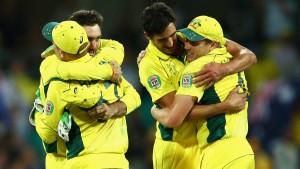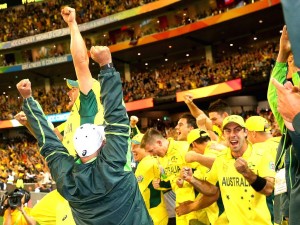 New Zealand lost influential captain Brendon McCullum to the fifth ball of the match and were bowled out for 183. Grant Elliott resisted with 83, while Mitchell Starc, Mitchell Johnson and James Faulkner shared eight wickets.
New Zealand lost influential captain Brendon McCullum to the fifth ball of the match and were bowled out for 183. Grant Elliott resisted with 83, while Mitchell Starc, Mitchell Johnson and James Faulkner shared eight wickets.
Australia rarely looked troubled, sealing a seven-wicket win in 33.1 overs, with Captain Michael Clarke scoring 74 and Steve Smith 56 not out. Clarke, in his final one-day international, was given a standing ovation by the record 93,000 crowd and welcomed by his team-mates on the boundary when he was bowled by Matt Henry with eight required.
He was part of the Australia team that last lifted the trophy in 2007, with this success extending their record for most World Cups won. No other team has more than two. Australia’s win was the second in as many tournaments by a host nation after India’s triumph four years ago. Australia’s win was the second in as many tournaments by a host nation after India’s triumph four years ago.
Australia lauded its World Cup winning team for a “fairy-tale” victory on home soil over New Zealand, with praise heaped on retiring one-day captain Michael Clarke after a dream farewell. Clarke hit 74 as Australia cruised home by seven wickets in a one-sided final in front of a record crowd of 93 013 at the Melbourne Cricket Ground.
The win, culminating a gruelling tournament, was front page news across the country with The Australian newspaper saying: “Pitch perfect Australia lives the dream to claim fifth World Cup.” “Done it without raising a sweat or anybody’s pulse,” the broadsheet’s cricket writer Peter Lalor said. “Michael Clarke’s side made easy work of New Zealand at the MCG, much as they had with India in the semi-final and Pakistan in the quarter.”
Thousands of fans turned out to greet the hungover team in Melbourne’s Federation Square with the biggest cheers reserved for Clarke. “A little hungover. I think I speak for everybody in that sense,” he said when asked how he was feeling.
 The Sydney Daily Telegraph focused its coverage on the outgoing Clarke, who announced his retirement from the one-day international format on the eve of the final. “Pup’s fairytale farewell as Aussies crowned world champions,” it said on its front page, referring to Clarke by his nickname. “Lifting the trophy provided Clarke the fairytale ending that seemed so unlikely in November, when his chronic hamstrings again betrayed him and the ambition of captaining a World Cup winning team appeared far-fetched,” it added.
The Sydney Daily Telegraph focused its coverage on the outgoing Clarke, who announced his retirement from the one-day international format on the eve of the final. “Pup’s fairytale farewell as Aussies crowned world champions,” it said on its front page, referring to Clarke by his nickname. “Lifting the trophy provided Clarke the fairytale ending that seemed so unlikely in November, when his chronic hamstrings again betrayed him and the ambition of captaining a World Cup winning team appeared far-fetched,” it added.
The captain, wearing a black armband, dedicated the win to Phillip Hughes, the teammate who died after being hit on the head by a bouncer last year, which the Telegraph said was a fitting tribute. “Of course no silverware could erase the painful memories of Phillip Hughes’ tragic and traumatising death,” cricket writer Richard Hinds said. “Yet, at the twilight of a confronting, even brutal summer, this was rich reward for Australia’s experience, endurance and composure.”
Australia batsman Hughes died on November 27 last year, two days after being hit on the head by a Sean Abbott bouncer in a first-class match in Sydney.
With Clarke choosing to now focus on test cricket, The Age in Melbourne said the team was in transition but was in good hands, with Steve Smith expected to be named his successor. “In Michael Clarke and Steven Smith, two generations of Australian cricket steered their team through the final leg of their long trek to a fifth World Cup,” wrote Malcolm Knox, the Fairfax Media cricket writer.
“The outgoing captain and the incoming; the elder who has battled his health all summer to get in, and the younger who has been almost impossible to get out. “With Clarke’s retirement from the one-day game, Australia is already in transition,” he added. “Brad Haddin, and presumably Shane Watson and Mitchell Johnson, will not be defending their title in England in 2019, but otherwise the strength of the current team is its youth.”





















